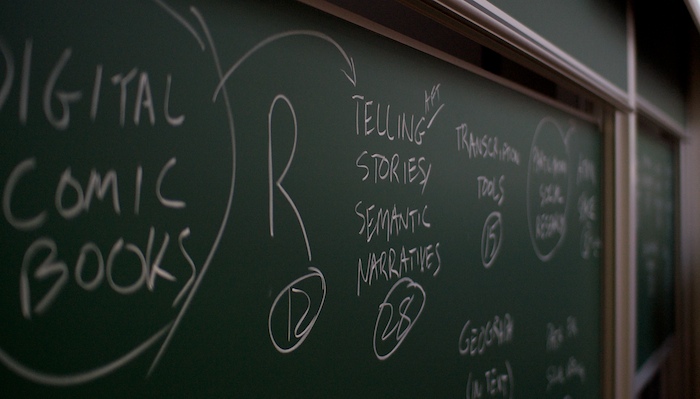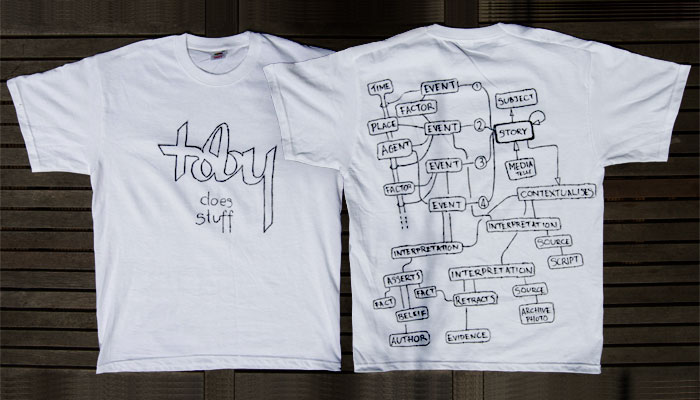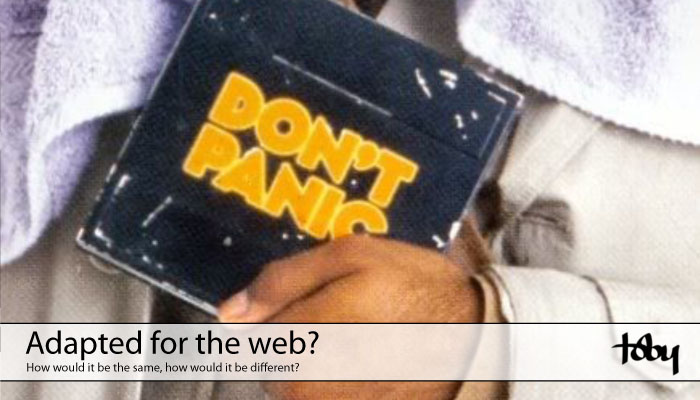‘BBC Stories’ was a six month placement project at the BBC as part of my first year on the Media and Arts Technology PhD programme at Queen Mary, University of London.
In abstract-speak:
Digital Narratives at the BBC is an experiment in short-form placements for academics within the BBC. Inspired by ideas of what a ‘web adaptation’ of a BBC property could be, it was determined that that while the BBC had a world-leading implementation of a metadata backed publishing platform, it did not have the domain model to facilitate metadata based publishing of its programmes. The production information was there, but the content information wasn’t.
Over the course of the placement this was addressed as a collaborative process between Paul Rissen, representing the BBC, Michael Jewell, a researcher with narrative modelling experience and myself, Toby Harris, a student on the Media and Arts Technology programme at Queen Mary, University of London.
An ontology was developed called ‘BBC Stories’ that aims to facilitate powerful journeys through BBC content. It presents a minimal, extensible core to meet the joint goals of simplistic application now while remaining compatible with more advanced use as adoption grows.
As introduction:
Parts of BBC Future Media and Technology run a ‘10% time’ initiative. ‘The idea is to get lots of good ideas and quickly built prototypes rather than complete solutions. Then, if the idea is good, it will get picked up by our normal production process.’ (Ferne, 2008)
This project, Digital Narratives, is born out of Paul Rissen’s 10% time, and is an earnest contribution towards some of those ‘good ideas’ getting into the BBC’s production process. In the words of Jonathan Tweed, a BBC employee interested in taking on the ideas for his group’s web productions, ‘how can we get a powerful journey through our content now – and what investment do we need to inspire to get to the vision?’.
So what is this vision? Developed over postings on Paul’s ‘R4 is static’ blog, the ‘Fourth Medium’ post gets to the heart of it, talking about developing something that could be considered a true ‘web adaptation’ of a story – something that, just like a film or book adaptation, for example, can tell the same core story, but in a manner that best uses the opportunities and idiosyncrasies of that medium. (Rissen, 2009)
The potential impact of this direction is far greater than considering the nuances of one medium over another, however. It touches on just what the internet could be, and consequently just what an organisation like the BBC could become. If the the British Broadcasting Corporation was created not at the birth of broadcasting, but instead for a ‘Web 3.0’ era, what would it look like?
Two broad contributions:
Working as a group with Paul Rissen and Michael Jewell, an ontology for the BBC to use for modelling their content has been developed. We have debated its finer points and possibilities endlessly, and I have the chat logs to prove it. As such, my feeling is that the place for critical analysis of this is not from any of us, but from the people who take it on. This is not a cop-out: as discussed in the review section, for any claim of validity from the production or real alignment with end-users the ontology should somehow embody a constant feedback process with its users, seeing what balance can be made between a shared worldview and a world of interpretations. And really, the whole process of post-hoc creation of the story world data is quite ridiculous: surely it should be embedded in the production process, gradually taking form as writers, editors, production staff access and develop it as a shared resource? It would feed back into the production process (somebody is already making prop lists, right?), but more importantly, at that point you have the feedback process there in front of you.
The central notion of interpretations is the second broad contribution. The notion that we are trying to ‘wikipedia-ise’ BBC programming has been a common one, and useful whenever explaining the project. But its actually exactly wrong for one very important reason: wikipedia attempts to present a shared world view on that topic, and despite this project being based around notions of ontology and modelling, this is exactly what we are trying not to do. Rather than present some form of lowest common denominator of agreement amongst the BBC content, we want the richness of all the BBC’s programming to be exposed, drawn together with a web of connections so people can immerse themselves in a world of content from which they can draw their own conclusions, and, perhaps yes, choose their own adventure.
The big regret I have with this project is that the time ran out just when it was getting really interesting. The project now needs some data-visualisation and next-generation drama people to jump on and run with it: having laid the foundations this time around, something I’d more than love to do given the time again.









